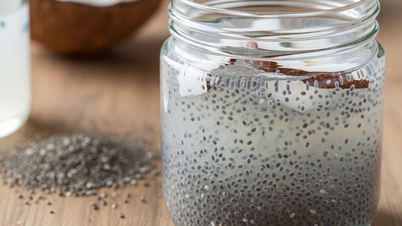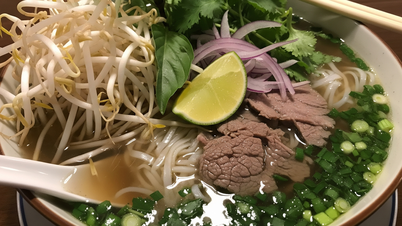Starting the day with health news , readers can also read more articles: Many chronic diseases are prescribed medication for more than 30 days; Habits after 5pm can silently cause stroke ; When is the best time to practice yoga for the body?...
Lifestyle changes for long-term kidney health
The kidneys are one of the most important organs in the body. Not only do they filter blood, remove waste and excess fluid, they also help maintain the overall balance of the body.
According to the Centers for Disease Control and Prevention (CDC), approximately 35.5 million people in the United States have chronic kidney disease. While many bad habits can damage your kidneys over time, a few small lifestyle changes can significantly improve your kidney health.
Here are some simple changes you can make to your daily routine to better care for your kidneys.

Drinking enough water also helps reduce the risk of kidney stones.
Photo: AI
Drinking enough water reduces the risk of kidney stones . Water helps the kidneys eliminate sodium, toxins and other waste from the body through urine. At the same time, drinking enough water also helps reduce the risk of kidney stones.
Every day, the body needs about 1.5 to 2 liters of water. In the summer or when doing a lot of physical activity, the amount of water needed to drink should be increased. When the body is hydrated, the kidneys will work more effectively and be less damaged.
Eat healthy. Diet has a direct impact on kidney health. According to recommendations, fruits such as apples, blueberries, oranges, lemons, cherries, pomegranates and strawberries are very beneficial for the kidneys.
Vegetables such as avocado, beans, broccoli, green leafy vegetables, tubers and seeds such as chia seeds and flax seeds are also considered good choices for people who want to protect their kidneys.
Controlling the amount of salt, sugar and harmful substances in the diet will help reduce the burden on the kidneys, thereby preventing the risk of kidney failure. The next content of this article will be on the health page on July 4 .
What is the best time to practice yoga for the body?
Yoga is not only a form of physical exercise but also a method of mental health care. One question that arises is whether to practice yoga in the morning or evening to achieve optimal results.
In reality, there is no one-size-fits-all answer. This is because both times offer their own advantages, depending on your goals, schedule, and personal circadian rhythm.

Practicing yoga in the morning or evening is good for your health.
PHOTO: AI
Benefits of morning yoga. Practicing morning yoga has a gentle stimulating effect on the body, increasing blood circulation and supplying oxygen to internal organs. Physical activity in the morning helps boost metabolism and improve energy levels throughout the day.
Yoga stretches the muscles after a long night's sleep, stimulates the lymphatic system, and helps eliminate toxins. In addition, practicing yoga in the morning will cause less disruption to the daily schedule, making it easier for practitioners to maintain a habit.
Experts say that combining yoga, meditation and deep breathing in the morning also helps improve concentration and enhance cognitive abilities throughout the day. The next content of this article will be on the health page on July 4 .
Habits after 5pm can silently cause stroke
Stroke is a dangerous disease that can occur suddenly and leave serious consequences.
Many people think that only what happens during the day affects health, but evening habits play an important role too. It is the small, consistent habits that can make a big impact in reducing the risk of chronic diseases, including heart disease and stroke.
Here are things to avoid after 5 p.m. to reduce the risk of stroke, according to Kelsey Kunik, a nutritionist working in the US.

Eating late at night can be harmful to your heart and brain health.
Photo: AI
Late dinner. Late dinners can become a habit if you are busy. However, this is harmful to your heart and brain health.
"Eating late at night can disrupt the body's circadian rhythm, negatively affecting blood pressure and metabolism," said Michelle Routhenstein, a nutritionist working in the US.
People who eat dinner after 9 p.m. have a higher risk of stroke than those who eat earlier. Similarly, eating breakfast too late can also have negative effects on health. Therefore, making a habit of eating breakfast and dinner early will support circadian rhythms and reduce the risk of stroke.
Being sedentary can increase your risk of stroke. Spending too much time sitting or lying down at night can increase your risk of stroke, even in young people.
People under 60 who are physically inactive and spend more than eight hours a day watching TV, using a computer or reading have a 3.5 times higher risk of stroke than people who sit less.
However, even light activity can be beneficial. A 20-minute walk after dinner can aid digestion and better control blood sugar. Start your day with health news to see more of this article!
Source: https://thanhnien.vn/ngay-moi-voi-tin-tuc-suc-khoe-muon-than-khoe-hay-tap-nhung-dieu-nay-185250704001721156.htm



![[Photo] General Secretary To Lam attends the opening ceremony of the National Achievements Exhibition](https://vphoto.vietnam.vn/thumb/1200x675/vietnam/resource/IMAGE/2025/8/28/d371751d37634474bb3d91c6f701be7f)
![[Photo] General Secretary To Lam presents the 45-year Party membership badge to comrade Phan Dinh Trac](https://vphoto.vietnam.vn/thumb/1200x675/vietnam/resource/IMAGE/2025/8/28/e2f08c400e504e38ac694bc6142ac331)
![[Photo] Red flag with yellow star flutters in France on National Day September 2](https://vphoto.vietnam.vn/thumb/1200x675/vietnam/resource/IMAGE/2025/8/28/f6fc12215220488bb859230b86b9cc12)
![[Photo] Politburo works with the Standing Committee of Cao Bang Provincial Party Committee and Hue City Party Committee](https://vphoto.vietnam.vn/thumb/1200x675/vietnam/resource/IMAGE/2025/8/28/fee8a847b1ff45188749eb0299c512b2)

![[Photo] National Assembly Chairman Tran Thanh Man holds talks with New Zealand Parliament Chairman](https://vphoto.vietnam.vn/thumb/1200x675/vietnam/resource/IMAGE/2025/8/28/c90fcbe09a1d4a028b7623ae366b741d)






























































































Comment (0)